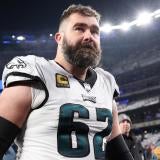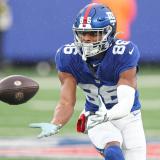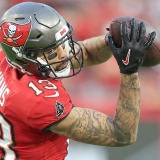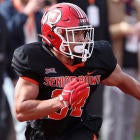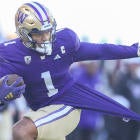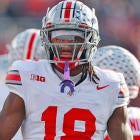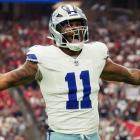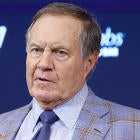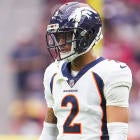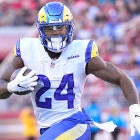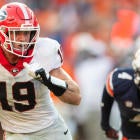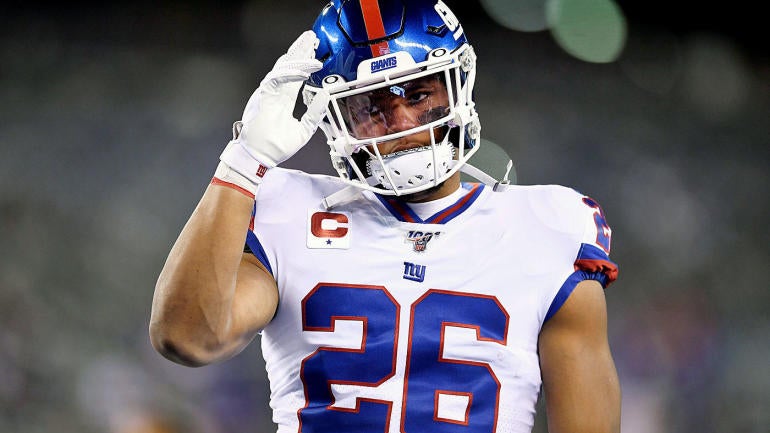
The role of the running back is rapidly changing. It's not as important as it once was to have the one, singular guy who can do everything, but it's still important that each team gets what it needs out of the position. Efficient running. Good pass protection. A solid outlet for the quarterback leaking out of the backfield.
Obviously, not all backs are equal. Some guys are just more effective than others. And some of them even occupy rival teams. All of which is to say, we're ranking the eight NFL divisions, but judging solely on which has the best running backs.
A quick note before we get to the rankings: we gave more weight to backs that play the most snaps (because obviously), but also gave deference to passing-game contributions over rushing ability to break ties, because passing has a far greater effect than running on both offensive efficiency and a team's ability to win.
8. AFC East
Devin Singletary, Zack Moss (Bills), Jordan Howard, Matt Breida (Dolphins), Sony Michel, James White, Rex Burkhead, Damien Harris (Patriots), Le'Veon Bell, Frank Gore (Jets)
This seems like the lone division without a star-level contributor at running back. Le'Veon Bell was that guy ... but that was three years ago. He sat out the entire 2018 season and was extremely ineffective last year. Some of that can be attributed to the team's poor offensive line and quarterback play, but he also seemed to have lost a step, and the Jets felt strongly enough to bring in some competition this year, in the form of Gore and Lamical Perine.
New England seems likely to base its offense around the run game, but Cam Newton will probably be their most effective rusher. Michel was running in quicksand all of last season. White and Burkhead have never been high-volume guys. Burkhead has only occasionally stayed healthy. White is losing Tom Brady, with whom he had tremendous chemistry. Harris couldn't get off the bench behind Michel last year. It's difficult to have a ton of confidence in this group.
The Howard-Breida combination makes sense on a conceptual level, with Howard as the power guy and Breida as the speed component. But Howard's last truly effective season was his rookie year, and he brings almost nothing in the passing game. Breida looked good every time the 49ers gave him a chance, but the coaching staff also kept turning to other options despite that, and then traded him for a late-round pick. Singletary looked good in limited action last season and seemed like he should have become the full-time back, but it's clear the Bills don't want to make him a true feature guy. Moss should prove to be a nice complement, given his size and pass-catching ability.
7. NFC West
Kenyan Drake, Chase Edmonds (Cardinals), Cam Akers, Darrell Henderson, Malcolm Brown (Rams), Chris Carson, Carlos Hyde (Seahawks), Raheem Mostert, Tevin Coleman, Jeffrey Wilson, Jerick McKinnon (49ers)
Drake looked fantastic in Arizona last season. But he also washed out from one of the worst rosters in the league. It's entirely possible that we can credit much of his success to Kliff Kingsbury's spread-field offense, which afforded him some of the widest running lanes in the league. He faced eight-plus defenders in the box on only 8.82 percent of his runs last season, per NFL.com's NextGen Stats, the fifth-lowest rate in the NFL. Still, he should be afforded similarly wide lanes in 2020, and Edmonds looked nearly as good as Drake when given a shot to tote the rock last season.
Neither Henderson nor Brown showed enough last season to give the Rams much confidence in them, as evidenced by the fact that they felt the need to use their first draft selection on another running back in Akers.
Carson is one of the most powerful runners in the league. He's a broken tackle machine and last season he stepped up his passing-game contributions. But he can't stop fumbling, and the Seahawks brought in like four more running backs (including Hyde) over the past few years. It's even possible that Travis Homer and DeeJay Dallas could factor in there. Meanwhile, the 49ers have a bunch of guys they can plug in and find success. The true star there is the system. That's why Mostert and Breida have been their most effective backs even though they paid Coleman and McKinnon big money.
6. AFC South
David Johnson, Duke Johnson (Texans), Marlon Mack, Jonathan Taylor, Nyheim Hines (Colts), Leonard Fournette, Ryquell Armstead (Jaguars), Derrick Henry (Titans)
Henry is a star. He runs over and through everybody in front of him. He doesn't contribute much as a receiver, but if the Titans get a lead, they can lean on him to end pretty much any game. On the other side of the spectrum, the Jaguars seemingly can't wait to get rid of Fournette, who simply has not lived up to expectations. Armstead has a bit of dynamism, but we don't know if it's anything more than that.
If I felt confident that the Texans would make Duke Johnson their lead back, this division might be higher on the list. Duke is one of the most efficient backs in the league, but he has somehow gotten pigeonholed as a third-down guy despite having pretty good size and being the all-time leader in rushing at the University of Miami. Alas, Bill O'Brien is one of the guys who has pigeonholed him, and it seems likely they'll try to force the ball to David Johnson, who was stuck in mud for much of last year. We haven't seen the superstar version of David Johnson since 2016. That's a long time ago.
Mack has looked good as the lead back for the past couple seasons, but he's also struggled with several injuries. The Colts maintain that he'll be involved in a committee this year, but they didn't draft Taylor at the top of the second round to give him 1B work. He should be the lead guy by mid-season, if not earlier. Hines is an excellent fit with Philip Rivers, but might find it difficult to get an Austin Ekeler-level of snaps.
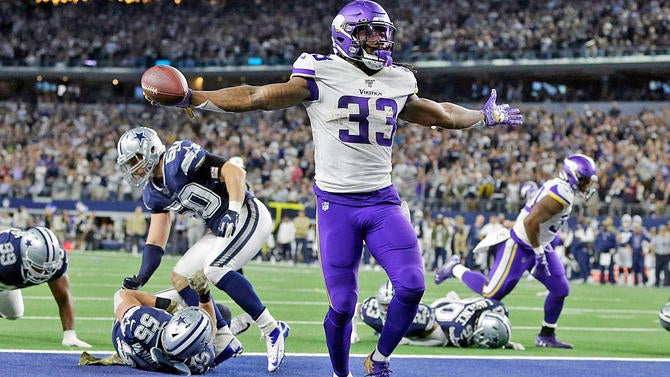
5. NFC North
David Montgomery, Tarik Cohen (Bears), Kerryon Johnson, D'Andre Swift (Lions), Aaron Jones, AJ Dillon, Jamaal Williams (Packers), Dalvin Cook, Alexander Mattison (Vikings)
Why, oh why, are the Packers so reluctant to give Aaron Jones a bell-cow role? He's clearly been the best back on the roster for several years, but two different coaches have resisted giving him the full-time job. And the second of those coaches just brought in a third running back to share snaps with him. Sigh. The Lions are similarly reluctant to give their lead role to Kerryon Johnson, but the difference is that Johnson hasn't been nearly as effective as Jones. Swift is also a more dynamic threat than either of the Packers' other backs, though, and a better pass-catcher as well.
Dalvin Cook finally stayed healthy last season, and recaptured the superstar talent he showed before tearing his ACL as a rookie. He's a home-run threat as a runner and also a terrific pass-catcher, making him a perfect fit for what modern NFL teams need out of their backs. Mattison looked just fine spelling Cook on limited snaps last season, and while the Vikes would surely prefer Cook's holdout not last all that long, they could feel okay about Mattison, Mike Boone, and Ameer Abdullah as a backup plan.
Montgomery was one of the least effective backs in the league last season. He led the nation in broken tackles two years ago, though, and that skill doesn't just disappear. If Chicago can get moderately better blocking so he can make it more than a yard down the field, maybe he'll find more success. The same goes for Cohen, whose average catch traveled approximately negative-37 yards last year. Get him out into open space more often.
4. AFC West
Melvin Gordon, Philip Lindsay, Royce Freeman (Broncos), Damien Williams, Clyde Edwards-Helaire (Chiefs), Austin Ekeler, Justin Jackson (Chargers), Josh Jacobs, Jalen Richard, Lynn Bowden (Raiders)
Gordon has not been a particularly efficient runner. He's failed to top 3.9 yards per carry in four of his five seasons, and he's been considerably below-average in Football Outsiders' success rate in three of his five seasons. However, he's been a valuable pass-catcher, chipping in with an average of 45 catches for 375 yards and two scores while playing only 13 games per season. Lindsay took a step backward last season, but he was still very effective as both a runner and pass-catcher. Freeman seems likely to be a non-factor when everyone's healthy, but at least provides an element of depth.
As we wrote prior to the Super Bowl, Williams is a perfect fit for the pass-heavy Kansas City offense. As a former third-down back, he's well-equipped to pass block and get out on routes, and he can take advantage of lighter boxes Kansas City often faces. Edwards-Helaire is just as good a fit. He was the best pass-catching back in the draft, and while taking him in the first round wasn't the best use of resources, he should prove extremely effective in this offense.
Ekeler is one of the best pass-catching backs in the league, and he's finally getting a shot as something resembling the No. 1 guy. He's only carried 15-plus times in a game three times in his career, though, so Jackson should be pretty significantly involved as well. He ripped off a few big runs last year but it's difficult to put much stock in such a limited sample. Jacobs had a strong rookie season and seems like the kind of guy who could be a full-time feature back, but the Raiders rarely gave him passing-game work last year, preferring instead to lean on Richard in those situations, and then announced Bowden as a running back at the draft, despite the fact that he played wide receiver and quarterback at Kentucky. Still, the latter two players are dynamic with the ball in their hands, and should provide Derek Carr with solid outlet options on the (too-frequent) occasions where he checks it down.
3. NFC South
Todd Gurley, Ito Smith (Falcons), Christian McCaffrey (Panthers), Alvin Kamara, Latavius Murray (Saints), Ronald Jones, KeShawn Vaughn, Dare Ogunbawale (Buccaneers)
The NFC South is home to the best running back in the game right now, in Christian McCaffrey. It's also home to a player who is likely the second-most dynamic pass-catching threat, in Alvin Kamara. The Saints have a strong No. 2 option behind Kamara in Murray, who looked fantastic as the lead guy when Kamara went down with an injury last year. Beyond those guys, though, the division is filled with question marks. which is what keeps the NFC South out of the top two.
Gurley was more effective last year than the common perception would have you believe, but his knee seems like a ticking time bomb and the only reason he was more effective than the perception is because the perception is that he was unplayable. Smith has yet to capitalize on his limited opportunities and seems unlikely to be ready to step into the lead role if Gurley struggles with injuries again.
Jones basically had two good games last year, and has been almost comically ineffective otherwise. Vaughn was not as strong a prospect as some of the other early-round running back picks, but should have a decent chance to overtake Jones as the lead back in this offense. Ogunbawale, though, seems like the best fit for Tom Brady, as the Tampa version of James White. He worked as the team's pass-catching back last year, and should do the same in 2020.
2. AFC North
Mark Ingram, JK Dobbins, Gus Edwards, Justice Hill (Ravens), Joe Mixon, Giovani Bernard (Bengals), Nick Chubb, Kareem Hunt (Browns), James Conner, Jaylen Samuels, Benny Snell, Anthony McFarland (Steelers)
Ingram proved to be an excellent fit alongside Lamar Jackson, with his north-south running style playing well off of the quarterback's speed and ability to threaten the edge. Edwards is even more of a downhill runner than Ingram, and has done extremely well in his limited opportunities. Hill wasn't much more than a gadget guy last year, but he's a fantastic athlete and a better pass-game contributor than Baltimore's other backs. If the Ravens do turn the backfield over to just one guy at some point, though, it's likely to be Dobbins, who is the most well-rounded of the bunch.
Mixon took off down the stretch of last season, topping 135 yards on the ground in three of the final four games. With an improved offensive line and better quarterback play, he should be afforded more room to run in 2020. Bernard has always been an efficient No. 2 option, and he'll remain just that behind Mixon. Conner has had some injury issues, but he's a two-way threat who can handle the bell-cow role when fully healthy. Samuels is more of a hybrid player, but McFarland should provide a decent amount of playmaking in what will presumably be a limited role during his rookie year.
The Browns, meanwhile, probably have the best one-two punch in the league. Chubb might be the best pure runner of the ball in the NFL, and he's an underrated pass-catcher as well. Hunt was one of the best backs in the league in his own right before getting dropped by the Chiefs, and after returning from his suspension last season he looked like one of the NFL's best pass-catching options out of the backfield.
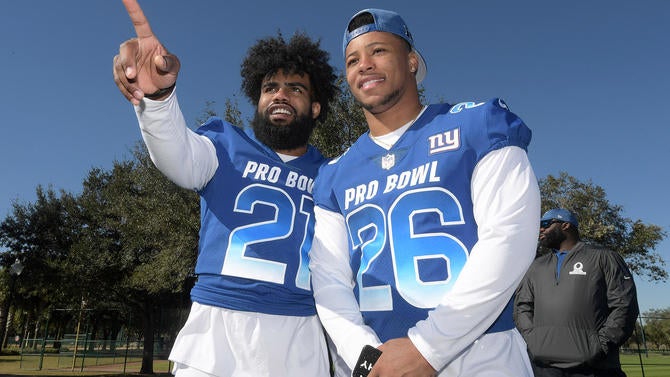
1. NFC East
Ezekiel Elliott, Tony Pollard (Cowboys), Saquon Barkley (Giants), Miles Sanders, Boston Scott (Eagles), Adrian Peterson, Derrius Guice, Antonio Gibson (Washington)
The NFC East has two of the five best backs in the league, with Elliott and Barkley. It has another guy who looks just about ready to join that group, with Sanders, who looked every bit of a three-down back last season while totaling 1,327 yards and six touchdowns scored on 229 touches.
That group is strong enough that it doesn't even necessarily need to be supported by two of the most efficient backups in the league to earn the No. 1 ranking, but those guys exist anyway. Pollard led the NFL in elusive rating last season, according to Pro Football Focus, and emerged as an excellent pass-catcher and tackle-breaking machine who created a ton of big plays. Scott may be diminutive in stature, but he was fantastic in limited action last year. The Eagles don't need him to be anything more than a spark plug behind Sanders, and he's a terrific fit for that role.
Peterson somehow just keeps churning out like four-and-a-half yards per carry like clockwork, pretty much every year. He's a total zero as a pass-catcher but on a team so committed to the run, he's a dependable option to be able to turn to. Clearly, Washington would prefer Guice stay on the field and become something resembling The Guy at some point, but whether he'll be able to is an open question. Gibson is a dynamic hybrid player who has been compared by the coaching staff to Christian McCaffrey. Nobody's that good, but if he can be a Chris Thompson type for them, that'll help a decent amount.









